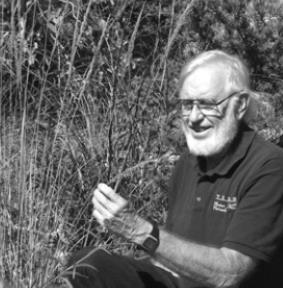The Odyssey of Atom X
Aldo Leopold’s “A Sand County Almanac” published in 1949, is one of my very favorite books, one I frequently reread parts of just for the joy of it. I recently reread one essay called “The Odyssey of Atom X. It is about the “mountains being washed to the sea,” but it is much more than that. Leopold was a prominent conservationist and naturalist in the early 20th century, and his work and teachings are frequently quoted by folks today.
Leopold begins: “Atom X had marked time in the limestone ledge since Paleozoic seas covered the land. Time to an atom locked in a rock, does not pass.
“The break came when a bur oak root nosed down a crack and began prying and sucking. In a flash of a century the rock decayed, and X was pulled out and up into the world of living things. He helped build a flower, which became an acorn, which fattened a deer, which fed an Indian, all in a single year.
“From his berth in the Indian’s bones, X joined again in chase and flight, feast and famine, hope and fear. He felt these things as changes in the little chemical pushes and pulls that tug timelessly at every atom. When the Indian took his leave of the prairie, X moldered briefly underground, only to embark on a second trip though the bloodstream of the land.
“This time it was a rootlet of bluestem that sucked him up and lodged him in a leaf that rode the green billows of the prairie June, sharing the common task of hoarding sunlight. To this leaf also fell the uncommon task, flicking shadows across a plover’s eggs. The ecstatic plover, hovering overhead, poured praises on something perfect: perhaps the eggs, perhaps the shadows, or perhaps the haze of pink phlox that lay on the prairie.
“When the departing plovers set wing for the Argentine, all the bluestems waved farewell with tall new tassels. When the first geese came out of the north and the bluestems glowed wine-red, a forehanded deer mouse cut the leaf in which X lay, and buried it in an underground nest, as if to hide a bit of Indian summer from the thieving frosts. But a fox detained the mouse, molds and fungi took the nest apart, and X lay in the soil again, foot-loose and fancy-free.
“Next he entered a tuft of sideoats grama, a buffalo, a buffalo chip, and again the soil. Next a spiderwort, a rabbit, an owl. Thence a tuft of sporobolus [a grass].
“All routines come to an end. This one ended with a prairie fire, which reduced the prairie plants to smoke, gas and ashes. Phosphorous and potash stayed with the ash, but the nitrogen atoms were gone with the wind.
“…Fires thinned the grasses, but they thickened its stand of leguminous herbs: prairie clover, bush clover, wild bean, vetch, lead-plant, trefoil, and Baptisia, each carrying its own bacteria housed in nodules on its rootlets. Each nodule pumped nitrogen out of the air into the plant, and then ultimately into the soil.
“…between each of his excursions through the biota, X lay in the soil and was carried by the rains, inch by inch, downhill. Living plants retarded the wash by impounding the atoms, dead plants by locking them into their decaying tissues. Animals ate the plants and carried them either uphill or downhill, depending on whether they died or defecated higher or lower than they fed. Thus a fox caught a gopher in a meadow, carrying X uphill to his bed on the brow of a ledge, where an eagle laid him low. The dying fox sensed the end of his chapter in foxdom, but not the new beginning in the odyssey of an atom.
“…One year, while X lay in a cottonwood, by the river, he was eaten by a beaver. The beaver starved when his pond dried up during a bitter frost. X rode the carcass down the spring freshnet [flooding river], losing more altitude each hour than heretofore in a century. He ended up in the silt of a backwater bayou where he fed a crawfish, a coon, and then an Indian, who laid him down to his last sleep in a mound on the riverbank. One spring an oxbow caved the bank, and after one short week of freshnet, X lay again in his ancient prison, the sea.”
Leopold certainly had a way with words.
Hope you had a good Christmas. Happy New Year—Wear your masks.
Until next time…
Jim Stanley is a Texas Master Naturalist and the author of the books “Hill Country Ecology,” “Hill Country Landowner’s Guide” and “A Beginner’s Handbook for Rural Texas Landowners.” He can be reached at <jstmn@ktc.com>. Previous columns can be seen at <www.hillcountrynaturalist.org>.

